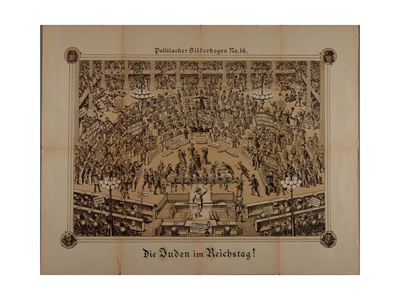Germany
° Berlin ° Bremen ° Cologne ° Dresden ° Dusseldorf ° Frankfurt ° Hamburg ° Munich ° Stuttgart
° Jewish Migrations
Jewish Migrations
Evidence of Jews in the area now known as Germany dates back to the early 4th century; in the 1930s, a Jewish graveyard from that era was found in the city of Cologne.
When the first Jews migrated to Western Europe, Christianity had not yet arrived; the Roman Empire was still the continent’s dominant power.
Little is known about the early German Jews, but by the 8th century, Jews were flourishing among the German tribes along the banks of the Rhine. The Jews, for the most part, lived in harmony with the developing Christians. Jews could hold public office, own land, and work in whatever industries they chose; they spoke the same languages and often had the same names as the Germans. Many Germans even converted to Judaism.
There was no unified German state. Early on, Germany had consisted of a number of tribes, often vying with one another for territorial control. Later the tribes joined into a loose confederation, which resulted in a semi-autonomous “Kingdom of Germany.”
Nonetheless, frequent civil wars and bids for power quickly destroyed any semblance of national unity. After Charlemagne united much of western Europe in the eighth century, Germany was a part of the Holy Roman Empire, which itself fell victim to occasional civil wars and fragmentation after Charlemagne’s death.
An additional factor that endeared the Jews to the rest of society was their economic role. While the Jews also worked as farmers and artisans, like the rest of society, they came to acquire a special reputation as merchants.
Nupital Ceremony of German Jews. 1725.
Bernard Picart

One positive result of the Jews’ economic station was the rise of the court Jew. Because Jews controlled the loan of money, the feudal lords in Germany, and elsewhere in Europe, became dependent on the more prominent Jews for funds. Often, the Jewish advisors were single-handedly responsible for helping a Lord to raise an army, build a palace or furnish some public facility.
BerlinNovember 13, 1901, San Francisco Call, San Francisco, California, U.S.A.
German Shipping Endangered.
LONDON, Nov. 13. "An American syndicate has purchased 10,000 shares of the stock of a Hamburg steamship line through a Vienna bank," says a Berlin correspondent of the Daily Mail. "The purchaser is thus enabled to demand at the next meeting a revision of the articles of association in its own favor. There is a general feeling here that the American danger to German shipping is more serious than has been supposed."
September 8, 1878, Daily Alta California, San Francisco, California, U.S.A.
THE CHILDREN OF ISRAEL.
 |
| The Jews in the Reichstag, 1895 German School |
"The Social and Political Condition of the Jewish People at the Present Time."
At the Young Men's Christian Association Hall, last night, Prof. Robt. Peck lectured on the above topic. "All nations," said the speaker, "are more or less localized, with the exception of the Jews, who are found in almost every civilized country of the world. All Jews, wherever born, look upon each other as members of one and the same nation. So long as the Jewish faith and the Jewish nation remain synonymous terms, this isolation will probably continue to exist."
Beginning with the Holy Land, which he said belonged to the Jews by right of Inheritance, the lecturer proceeded to briefly discuss the condition of tbe Hebrew people in the various countries of the world. In Palestine, there are 13,600 Jews, a number greater than that of the Christian and Musselmans combined. They came mostly from Russia, and have established an Agricultural College at Jaffa. European Turkey contains 360,000 Jews, residing chiefly at Constantinople aud Adrianople. In Asiatic Turkey, they may be estimated at 120,000. Theo Mohammedans accord the Jews equal rights with all non-bolievers in the faith of Islam. There are over 267,000 Jews in Roumanla and Servla who have endured great hardships, being treated after tbe manner of Pharaoh of old.
Russia is the home of 2,600,000 Jews, who are mostly found in the districts which formerly belonged to Poland. The present enlightened Czar has shown himself in favor of giving a full degree of civil and religious liberty to the Jews; but this will depend in a large measure on the manner in which they comply with the new compulsory military law.
Next to Russia, the largest number of Jews is located In Austria and the Hungarian Provinces, there being in tbe former 841,220, and 666,641 in the latter.
In these conntries, as in many others, the Jews are taking tbn upper hand in matters of trade and finance. The Vienna Press is largely controlled by Jews. Upward of 600,000 Jews Inhabit the German Empire, where they have enjoyed equality of political rights for more than fifteen years. In science, art and literature, the German Jews have greatly distinguished themselves. By the annexation of Alsace and Lorraine, 40,000 Jews were added to the population of the Empire.
In Holland, Spain, Italy, and the other European countries, the Hebrew race ia continually gaining In numbers and power. In Africa there are a large number of colored Jews. The fame of Disraeli had added new glory to the Jewish portion of the United Kingdom of Greet Britain. In the United States there are about 200,000 Jews.
The lecturer closed with an allusion to the persecutions which tbe Jews had undergone in all lands. The statement that Christ was crucified by Jews was emphatically denied, and that crime was charged to the Romans. " At last Moses, the great law-giver, and Christ, the man who went about doing good, will blot all fanatical enemies of the Jewish people out of existence."
German-Americans
German-Americans represent the largest group of immigrants arriving in the United States in all but three of the years between 1854 and 1894. (As this is written, reports indicate that the most-spoken language in American homes other than English is German.)
August 18, 1883, American Settler
IMMIGRATION AND ITS EFFECTS
The following table shows the distribution of the immigration movement among all the principal nationalities in the last two years. It should be said that the totals here given are somewhat smaller than those for the same years above, because presumably the latter include the movement at every port of the country, while the former include only movement at the ten leading ports given in the table further, below, which ten ports, however, embrace within a small percentage of the entire movement.
The poor harvests during those years in Europe also contributed to swell the movement. With the failure of our crops, however, and the other adverse circumstances that followed such as the check to railroad expansion and the consequent diminution in the consumption of many of our manufactured articles the United States presented a less inviting option for immigrants intending to better their condition, and many no doubt were deterred who otherwise would have come.
Countries from which Immigrants arrived:
(Note: The following numbers are difficult to read in the newspaper; figures may be off somewhat, but this will give an overview of immigration during the 1882-1883.)
Name |
1883 |
1882 |
| England and Wales | 79,852 |
83,697 |
| Ireland | 63,720 |
76,252 |
| Scotland | 19,612 |
18,763 |
| Austria | 10,517 |
20,089 |
| Germany | 191,648 |
249,169 |
| Italy | 31,715 |
33.066 |
| Norway | 21,849 |
28,466 |
| Sweden | 84,596 |
64,276 |
| Dominion of Canada | 64,971 |
93,029 |
| All Other Countries | 78,849 |
104,623 |
| Total | 593,327 |
770,422 |
Before the end of the century more than 5 million Germans had arrived. They came from a wide geographic area and for a variety of reasons. They were a highly diversified group in terms of regional origin, religious and political orientation, education and socio-economic standing.
This migration began early in January of 1709 and a German settlement was founded in New Bern, North Carolina. By April of 1709, German settlements were established along the Hudson River in New York.
The strength and success of German shipping gve German metropolitan merchants a competitive edge in the Far East. Penang and Singapore were the main ports of call for German ships since 1872. The "Deutsche Dampfschiffs-Reederei zu Hamburg," commonly known as the "Kingsin Line," offered the first steamship service to the Far East, sailing only once every two months.
In response to demands raised by German trading houses for more regular services of a higher standard, the German Bismarck and his postmaster-general, Heinrich von Stephan, signed a contract in 1885 with the Norddeutscher Lloyd (North German Lloyd) of Bremen to operate the Imperial Mail Steamer Services. British shipping found it difficult to compete with German shipping because of this government subsidy.
October 4, 1893, Galveston Daily News, Galveston, Texas, U.S.A.
WARSHIP AGITATION
Recent Criticism in England Finds Hearty Response In Germany.
Berlin, Sept. 30 . The recent agitation in England in regard to the defenses found in the British warships, brought on mainly by the disaster to the Victoria, has had an echo here.
It will be remembered that in the house of commons recently Mr. Edward T. Gourney, a well known ship builder and member from Sunderland, asked whether since the sinking or the warship Victoria the government's attention has been directed to the criticism of experts at home and abroad as to the utility of ships of monstrous size. It was claimed that the majority of the large British battleships were comparatively useless for the purpose they were intended for. It was also suggested that the British fleet would be more strengthened by the addition of a large number of fast cruisers, of powerful rams, and vessels of a type smaller and less expensive than the monster battleships which seem to find so much favor with the British ship builders.
In this country the reported increase in the naval estimate has caused much dissatisfaction among the radicals and liberals, who claim that Germany does not need a strong navy nor an addition to the army. The ship building experts of Germany have followed closely the crltlcism made in England upon the British warship which has recently met with disaster, and the German exports insist that the present existing type of German warships is especially unsulted to Germany. They cite as an instance that the Koenig Wilhelm and Deutschland are scarcely able to use their guns during a heavy sea. This fact was instanced recently during the naval maneuvers in the German ocean, and it is claimed thut these ships were shown to be thoroughly unsuited for Germany's flat-land coasts. The Koenig Wilhelm was launched in 1869, has twelve inches of armor, carries eighteen four and a half ton guns and four twelve-ton guns. She has 8000 indicated horse-power and a tonnage displacement of 9757 tons. The Crown Prince has only five inches of armor and carries sixteen nine-ton guns. She is of 6800 indicated horsepower and has a displacement of 5568 tons.
As an instance of the rolling propensities of this ship it is said that on a recent cruise she met with rather rough weather, nearly all of her officers and sailors were more or less sea-sick, and those who were not sea-sick were pitched about and bruised In an alarming manner. Of course these facts may be much exaggerated, but there seems no doubt that the complaint made against such ships as the Crown Princeare deserved. It will be remembered that complaints of a similar nature have been made against several warships in Great Britain.
The Deutschland has ten inches of armor, carries eight twenty-three-ton guns and seven four-ton guns. She has 9000 indicated horse-power and a displacement of 7700 tons. It is also known and has been admitted for a long time past that warships like the Crown Prince roll so much in the German ocean that their crews are scarcely able to move at all. In view of these facts it is more than likely that the government will meet with serious opposition in carrying out Emperor William's project to increase the strength of the German navy.
May 17, 1898, Sacramento Daily Union, Sacramento, California, U.S.A.
Emancipation of Jews in Germany.
The "Frankfurter Zeitung" draws attention to the fact that the present year celebrates the jubilee of the emancipation of the German Jews. This subject was treated in an interesting address given by the director, Dr. M. Hirsch, before the Ben-Usiel Verein, and brought to a close the series of religious and philosophical lectures at that institution. The year 1848, which marked the demolition of much despotism and brought freedom into many sections of the community, also gave political freedom to the German Jews. The rights which were then confirmed were not altogether new, as they had been formally granted, and to a large extent allowed, during the Napoleonic rule on the Continent of Europe.
The French Revolution sounded the note of freedom, but in the reaction which followed Jewish rights were, along with many others, pushed aside, and in less than another half-century had to be again fought out. By this time much had been written against the Jews, and much injustice done, and even so late as 1831 the Senate of the Free City of Frankfort refused to repeal the regulations limiting Jewish marriages. It was not till the general cry for freedom came from the people of Germany, in 1848, that Jewish rights were fully discussed and finally established. The Duchy of Hessen-Homburg was the first German State to grant a full Jewish emancipation, giving our coreligionists full and equal rights with other citizens: Hesse-Darmstadt followed. ~ Jewish Chronicle.
German Settlements in the United States
Relatives and friends who emigrated first would write back and encourage others to follow. This led to "chain migrations" and group settlements. Fairly well-to-do farmers who saw a bleak future, poor ones with no future, paupers whom the authorities often paid to leave, revolutionaries after 1848, and many artisans, professionals, and some adventurers made up the spectrum of the 1840s and 1850s. One prosperous innkeeper wrote after arriving in Wisconsin: "I would prefer the civilized, cultured, Germany to America if it were still in its former orderly condition, but as it has turned out recently, and with the threatening prospect for the future of religion and politics, I prefer America. Here I can live a more quiet, and undisturbed life."
New York City was popular with German immigrants. By 1860 over 100,000 Germans lived in the city and owned 20 churches, 50 schools, 10 bookstores and two German language daily newspapers. There was also an estimated 130,000 German-born immigrants in Chicago. The city became a centre of German culture with bands, orchestras and a theatre. Milwaukee, known as the German Athens, and Cincinnati, also had large numbers of Germans. One journalist wrote in the Houston Post, commented "Germany seems to have lost all of her foreign possessions with the exception of Milwaukee, St. Louis and Cincinnati."
German Jews in the United States

In the 1850s a large number of German Jews began arriving in the United States. This included several who became successful in business such as Joseph Seligman (banking), Solomon Loeb (banking), August Belmont (banking), Isidor Straus (department stores), Paul Warburg (banking), Jacob Schiff (banking) and Otto Kahn (banking). A survey in 1890 revealed that about a half of the German Jewish population in the United States were in business.
1899. World's Fleet. Boston Daily Globe
Lloyds Register of Shipping gives the entire fleet of the world as 28,180 steamers and sailing vessels, with a total tonnage of 27,673,628, of which 39 perent are British.
| Great Britain | 10,990 vessels, total tonnage of 10,792,714 |
| United States | 3,010 vessels, total tonnage of 2,405,887 |
| Norway | 2,528 vessels, tonnage of 1,604,230 |
| Germany | 1,676 vessels, with a tonnage of 2,453,334, in which are included her particularly large ships. |
| Sweden | 1,408 vessels with a tonnage of 643, 527 |
| Italy | 1,150 vessels |
| France | 1,182 vessels |
For Historical Comparison
Top 10 Maritime Nations Ranked by Value (2017)
| Country | # of Vessels | Gross Tonnage (m) |
Total Value (USDbn) |
|
|---|---|---|---|---|
| 1 | Greece | 4,453 | 206.47 | $88.0 |
| 2 | Japan | 4,317 | 150.26 | $79.8 |
| 3 | China | 4,938 | 159.71 | $71.7 |
| 4 | USA | 2,399 | 55.92 | $46.5 |
| 5 | Singapore | 2,662 | 64.03 | $41.7 |
| 6 | Norway | 1,668 | 39.68 | $41.1 |
| 7 | Germany | 2,923 | 81.17 | $30.3 |
| 8 | UK | 883 | 28.78 | $24.3 |
| 9 | Denmark | 1,040 | 36.17 | $23.4 |
| 10 | South Korea | 1,484 | 49.88 | $20.1 |
| Total | 26,767 | 87.21 | $466.9 | |














 Copyright ~ 1998-2018.
Copyright ~ 1998-2018. 